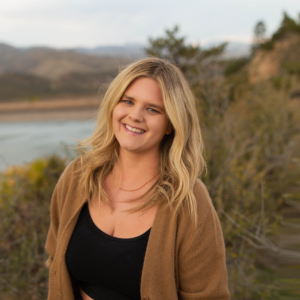Introducing famed conservationists Dereck and Beverly Joubert
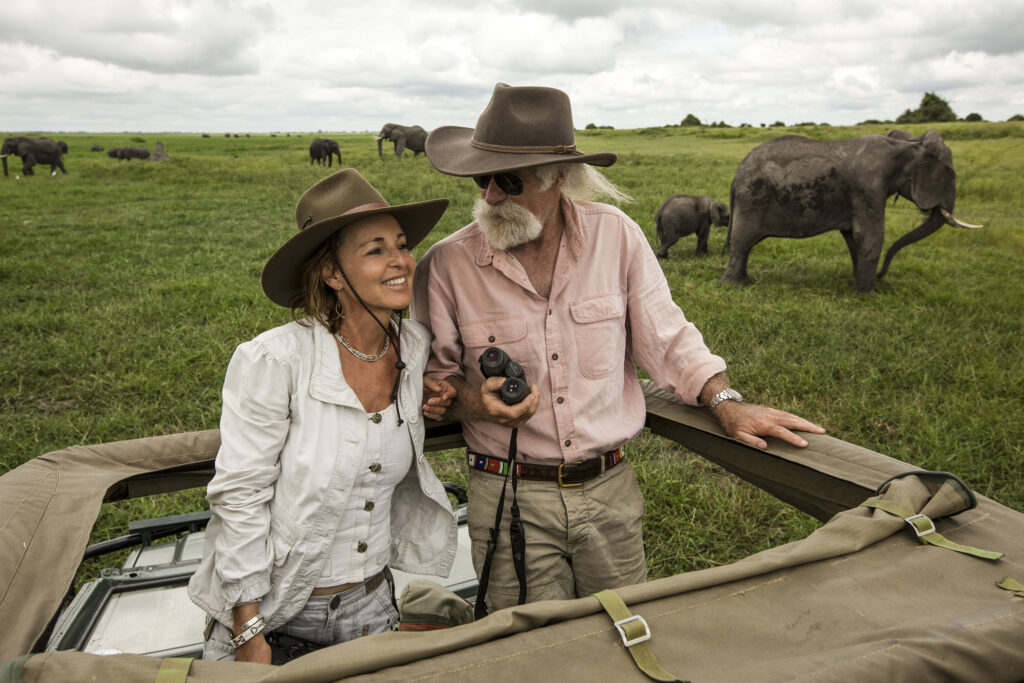
If you’re interested in conservation in Africa, you already know the Jouberts—famed conservationists, documentarians, photographers, National Geographic Explorers, and owners of Great Plains Conservation—some of our favorite camps in Botswana, Zimbabwe, and Kenya. If you’re looking to travel somewhere which has a holistic experience of high-end luxury safari paired with unparalleled conservation initiatives in parts of Africa that are still untouched (and they intend to keep them that way), this is it. Dereck and Beverly Joubert have made it their lives mission to conserve Africa’s wild places. We sat down with Dereck while he was at their camp, Mara Nyika, in Kenya (and we got a guest appearance from Beverly) to chat about sustainable tourism, conservation, and Earth Month…
Sustainable tourism
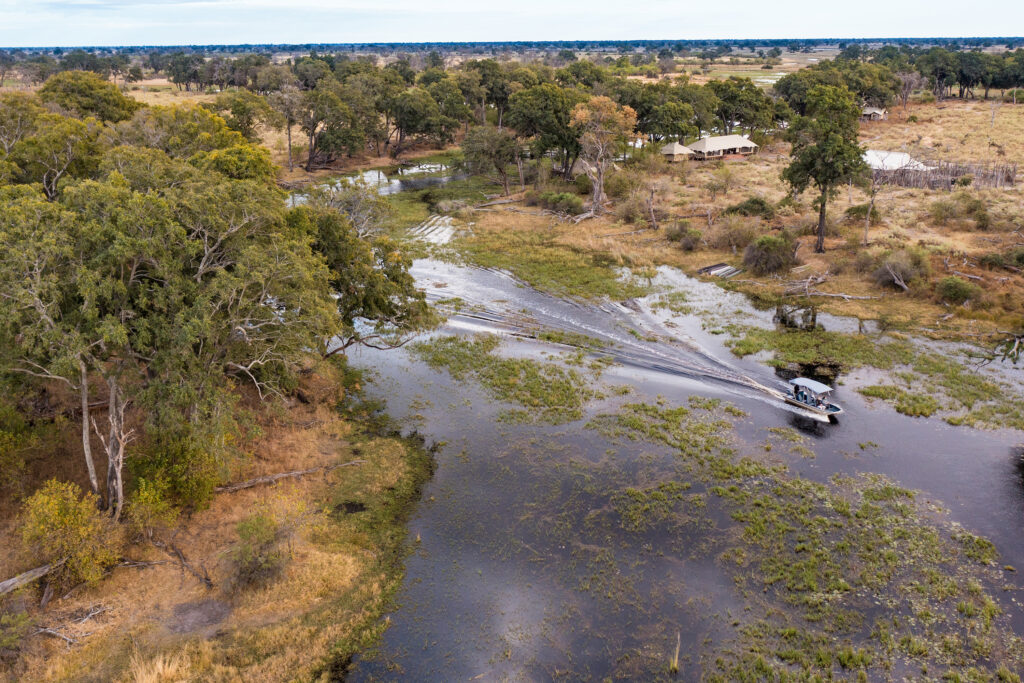
Alicia-Rae Light: We know you live and breathe conservation and sustainable tourism in Africa every day, so Earth Month might just be like any month for you, but personally, what does Earth Month mean to you?
Dereck Joubert: The entire reason to have an Earth Month is there’s a sort of reminder to pay attention to the planet. Every other day we should as well, but on Earth Month, it should be: Stop, think about how we are going to deal with a planet with eight to 10 billion people on it going forward. Think about the role that we can all play to try and mitigate some things that are coming at us hard and fast by modifying our own behavior. I think it’s a day of reflection. And a little bit like going into the new year with a resolution, perhaps even renewing that contract and saying this Earth Month, I’m going to resolve to…. fill in the gap. There’s a range of things we can most certainly be doing that can be kinder to the earth because without it, there’s no wildlife, and without wildlife, without biodiversity, there are no people.
But the other thing I would urge them not to miss the opportunity to bring children if children get exposed to and become early-stage conservationists. They shouldn’t be excluded from an experience like this—it’s not just for big people.
Beverly Joubert: You know, our whole philosophy from the time we started has been conservation, and the core of everything we do is conservation. Even though it feels like our ball is in many different courts, there always is that core, and with that core, one would hope that if people know enough about Great Plains, they are already conscientious travelers. But how do we turn many more people into being more conscientious about their decisions on where they’re going to and go to places where they can give back? We know people around the world that are desperate to give back, but they don’t have the means because they’re not in the areas where it is hardest for humanity in third-world countries to love. And so we are happy to be that portal for people to give, and they can give through us.
Alicia-Rae: Great Plains is very highly focused on conservation. You have a lot of projects and initiatives. In your own words, what does conservation tourism mean to you?
Dereck Joubert: I think coming out into these ecosystems can be one of many things. But it’s certainly not coming out, checking all the boxes, seeing the cheetahs, lions, and so on, then going home. What we do best is involve people in the conservation of the area, involve some of their revenues towards the conservation of the area, and involve the fireside chats around conservation. I think [coming to a Great Plains Camp] is a deep dive into conservation using the opportunity of travel.
Our whole philosophy from the time we started has been conservation, and it’s the core of everything we do; even though it feels like our ball is in many different courts, there always is that core. There are already conscientious travelers, but consider how we turn many more people into being more conscientious about their decisions on where they’re going to travel and choose places where they can give back.
Alicia-Rae: Do you have any examples of work you’re doing in the communities and giving back? You’ve mentioned planting trees with a project called Green Hearts, feeding children in villages that are encouraging them to go to school with a feeding scheme, and supporting women with micro businesses like you’re doing with something called the Solar Mamas—can you tell me more about that?
Beverly Joubert: We gave out solar jars in Botswana, and that was a fantastic experiment. It was an initiative to give families on the ground light so they didn’t have to use fire or candles because they are living under thatched roofs, and if a candle falls over, it can be disastrous—many have burned down their homes and even lost lives. And so these little jars were fantastic, and we invited our guests to buy them for the communities as well. We also gave out hundreds to the schools. And the principal wrote to us five to six months later, and he said, my gosh, I had no idea the repercussion of these lights—the kids now have excellent grades, and we believe that it’s because they have light at night. So we took that to the next level and started the solar mamas where we educated these ladies, and now they’re putting solar panels on the thatch roofs, and they’re giving power to the people and to the community.
In the Western world, we take many things for granted—and even though we are actually in Africa, we also take it all for granted. And when you realize the little things that can change their lives, like having power so that they charge a cell phone so they can create their own micro business or so that they have security at night time.
So we’re often bringing the community into being part of what we are doing in conservation. They are the conservationists today, and their children are the future conservationists of tomorrow. So the more they’re educated in protecting these areas, the happier our planet can be.
So what did was we took these ladies, sent them to India for training, and then when they came back to Botswana after nine months, we bought on their behalf two containers of solar equipment. They drew from there and paid it back by going into households and selling the service—installing a solar panel and a battery with a monthly rental fee. So they then charge their community members a monthly rental, and so they’ve started their own business.
Dereck Joubert: I think teaching people business skills and then nurturing them through that creates real social and commercial skills.
Slow Travel
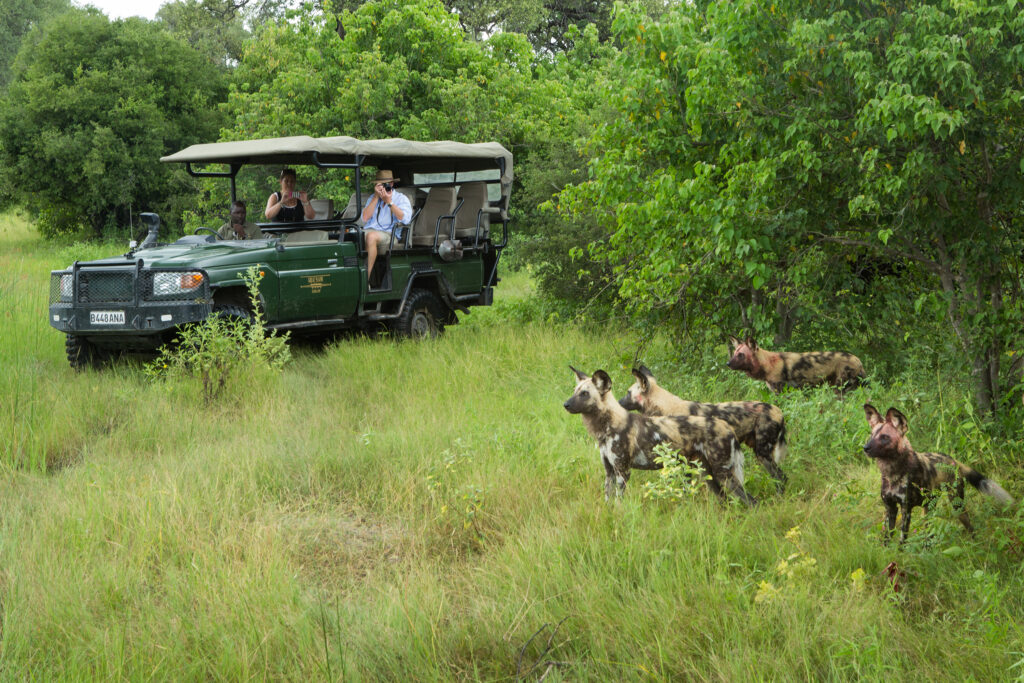
Alicia-Rae: We’re encouraging slower travel and for our guests to take time to get more intimate with the camps and connect with the places they are traveling. Do you have any ways of encouraging people to spend more time in one spot rather than moving around?
Dereck Joubert: I think a lot of people just want to get to Africa and see and do everything—as much as they can. But actually, I would say that it’s a much more positive experience to slow down and stay in one place and get to know it.
The thing about it—is depends on what you want. I know that what I want, wherever I go, whether I’m going to see polar bears or lions or cheetahs, I want to understand that system. Blasting out here and bumbling around here with jetlag for two and a half days and then moving off to the next destination isn’t the best experience. At best, you’re going get a glimpse of a cheetah, maybe a leopard, or the lions, but you’re not going to understand it. For me, that’s almost the biggest reason to come, move in, unpack your bags, and come into a very beautiful tent—that’s probably larger than most New York apartments, by the way—and live here for eight to 10 days.
That way, you have time to find a leopard one day, then go find her again the next, and then follow her to where the cubs are and get to know the cubs. And if you miss the hunt on the first day, it’s fine because she’s going to hunt on the second. Whereas if you’re blasting through her and the hunt happens on the second day, and you’ve missed it.
We get a lot of travelers that come from places like London, New York, or San Francisco with this high-anxiety lifestyle. They come in here, and they just change the backdrop, but they have the same high-anxiety life, just in a different place. So that’s what slow travel’s all about; it’s the way you can go on a journey that can enhance your life where you can stop, slow it down, think about things, and look at small things.
Alicia-Rae: And what would you recommend to people that have to get back to work or can’t disconnect or be away from their computers and connection for more than a few days?
Dereck Joubert: What we’ve done—and most certainly ramped up over the pandemic—are we’ve put in workstations, desks, and good internet so that people can come in and, and live here for a week or two weeks. They can run their businesses, check on their stocks, and not feel they’re missing out on that. For some people, being disconnected for a whole day can be life or death for their business, so I don’t want to send a message to those people that they just shouldn’t come because they should come.
On life lessons learned from Elephants
Alicia-Rae: Do you have a place where you feel the most at ease
Dereck Joubert: Anywhere that Beverly is. And I don’t think that any moment spent with elephants is a wasted moment. Elephants teach us so much; they slow us down, they guide us, and we can learn lessons from them. For that reason, I love the Selinda area of the Okavango Delta of Botswana and Tembo Plains in Sapi Private Reserve in Zimbabwe. Going out on the river from our Zimbabwe properties is amazing for those silent moments when people don’t talk for two or three hours.
I love being around elephants, I think they center us all, and I love being with lions. For me, Duba Plains in Botswana is a second home—or maybe even our first home. But, we’re finding we’re spending more and more time in Kenya and getting to know this cast of characters here.
Alicia-Rae: When you say elephants teach you lessons, what do you mean by that—what kinds of lessons can we learn from them?
Dereck Joubert: One of the great experiences in sitting with elephants for a couple of hours is you can point to their characteristics and say there’s a great example of empathy, there’s a great example of altruism within the elephant world. There’s kindness going on over there; there’s a lesson going on over here for children. There’s trust in them moving together through difficult situations, and they follow behind a matriarch, and there’s a great leadership example within that. In fact, elephants embody empathy, altruism, dignity, grace, trust, language, respect, and all those things. In fact, those are all the things we most like about ourselves, and they embody none of the things we don’t like about ourselves. Elephants never go to war; they don’t do anything mean-spirited And, as far as I can understand, I’m still busy learning elephants, but they’re never gossip either. Just kidding—I’m pretty sure they do gossip because they’re talking all the time and they’re communicating. But there’s a certain peacefulness around them that we can learn.
So when we were setting up our company, I defined a credo and our ethical rules and decided that we would run Great Plains like a herd of elephants rather than a wolf pack or a dog pack or any of those other things—a herd of elephants. And what’s interesting about a herd of elephants is that they embody all those things I was just talking about, but they also seem to move as a group, as a company, and as a herd, but at various paces.
So if somebody’s falling behind, they don’t just get discarded or fired and let go. The whole herd adjusts slightly. Somebody goes back, collects the injured one, or the one that’s lagging, or the one that’s just got absorbed in feeding and got left behind. Like a concertina (accordion), they go out, and then they go in, and they make tremendous distance that way. And I think there can be no greater guide for company leadership than heard of elephants.
Ecotourism examples
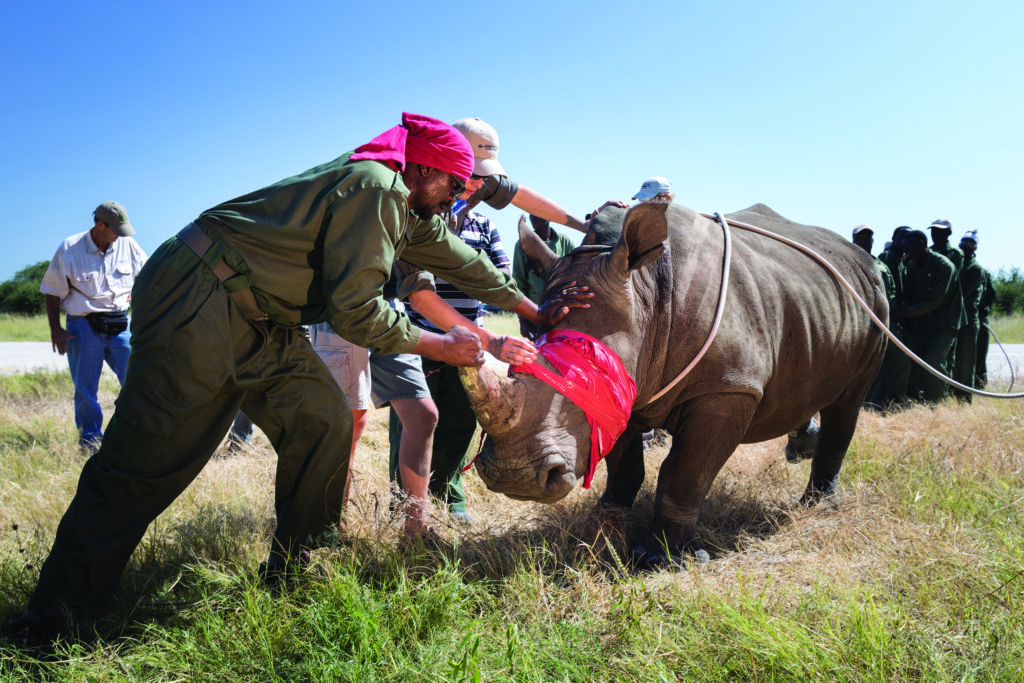
Alicia-Rae: How have you personally seen tourism have a positive impact on the wildlife and communities in the regions that Great Plains works in?
The best example of that is a negative example. Up until 2020, we were all saying that we had a positive impact on conservation. In 2020 that came to a dead stop. So we had the perfect example to understand what happens to Africa without tourism. I can tell you what really happened: first, job losses—not in Great Plains, we managed to keep all of our people—but job losses rippled through the industry. Lodges had to send people back home to their villages.
At the moment, in Great Plains, we employ about 800 people. So, 8,000 people are getting food on their tables through being employed by us, but in many cases, that all went away. The secondary result of that was that people could no longer rely on conservation tourism, and there were no people out in the field, no eyes and ears in the field. Poaching escalated and we didn’t realize how many conservation dollars were being generated by tourism, by people coming into the parks, and by going into communities. Only once that all went away, only then did we really get a sense of how important tourism is. I think that the upside of conservation and tourism is, first of all, people coming created jobs and makes sure that people are meaningfully employed.
Alicia-Rae: Can you tell me a bit about Project Ranger?
Dereck Joubert: We looked around, and we said, look, there’s all these field rangers have been laid off. So we started Project Ranger, and we generated a couple of million dollars in that time to give away to many rangers. Not in Great Plains concessions because we didn’t need it, but to put into other facilities where money stopped, and people were sent home. So, keeping Project Ranger going as an effort, in case [a pandemic] happens again, is a real solution. It makes sure that we can give these guys acknowledgment, give them attention, and give them funding when they need it. And also to make sure that the message goes from the West to them, that they are appreciated—that’s what it’s all about.
Alicia-Rae: What happens if a pandemic happens again or something similar which puts tourism to a halt? What happens to the local economy when tourism stops, and is that something you’re thinking about?
Dereck Joubert: What happened in our case is nothing stopped, so everybody stayed employed. In fact, what we did was we said to our waiters, chefs, and drivers that we don’t need you waiting, cooking, and driving. But we do need a very robust anti-poaching force. We redeployed a lot of the guides, in particular, into monitoring and patrolling. We gave them different jobs and kept them on the same salaries, but just switched directions so that the wildlife was protected.
Truthfully, we didn’t really need that, but I also used it as an opportunity to have them become conservationists. Now, when they take somebody out, they say during the pandemic when I was walking up and down the fence line, checking for a poacher, you know, so they felt part of the solution rather than sitting in a home as victims.
Learn more about African ecotourism
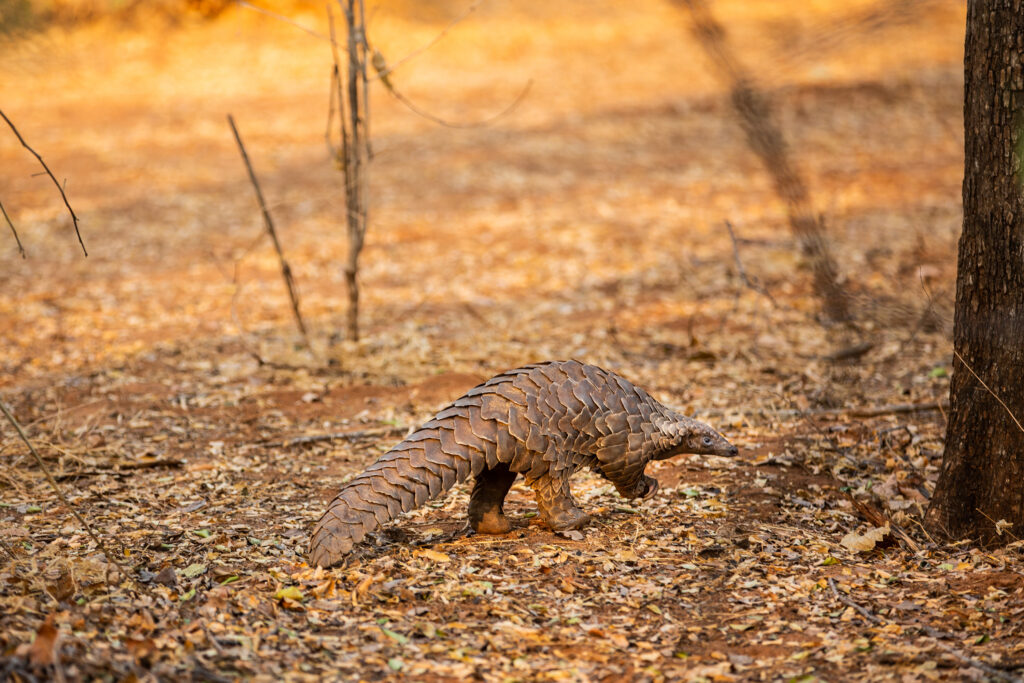
Alicia-Rae: Project Rewild Zambezi has successfully translocated elephants and other animals on an approximate 1,000km journey across Zimbabwe to Great Plains Conservation’s private Sapi Reserve. Can you give us an update on that and how guests can get involved?
Dereck Joubert: We translocated 101 elephants and 200 other animals in Zimbabwe, and now we’ve got collars on those animals watching their movements, looking at how they’re interacting with local animals. Most notably, we’re using this season as an opportunity to understand how they are integrating.
With that specific project, anybody coming to stay at Tembo at the moment can go out with the female rangers that are being trained right now. They can also go into the operations center where we are monitoring and tracking those 101 elephants that we brought in and all the other animals.
What we were worried about when we started moving these animals it was not that they were from a different region or whether they would adapt or not, but if, because of the separation of 500 miles, they would speak the same language—whether they would still speak elephant. Is there a universal elephant language? What’s interesting is that people on the ground can go out and see this in play.
We released a new elephant herd from the southern part of Zimbabwe—little family groups of eight to 10 at the time, and the first thing that happened was five of the herds we brought in clustered together and started moving around as a big group of about 50 animals. After about two or three weeks, they discovered the residents. They got into a little figure-of-eight pattern until they met the resident elephants and went to the river with them. Now quite a herd now is moving around and sticking together, which is quite incredible.
So, there was probably some dialogue and communication, which I found just totally fascinating. We’re finding that the new elephants that have come in have integrated into the herds there, and as a result, they’re not trying to find their way home. They’ve got a new home, and there’s good food and good water.
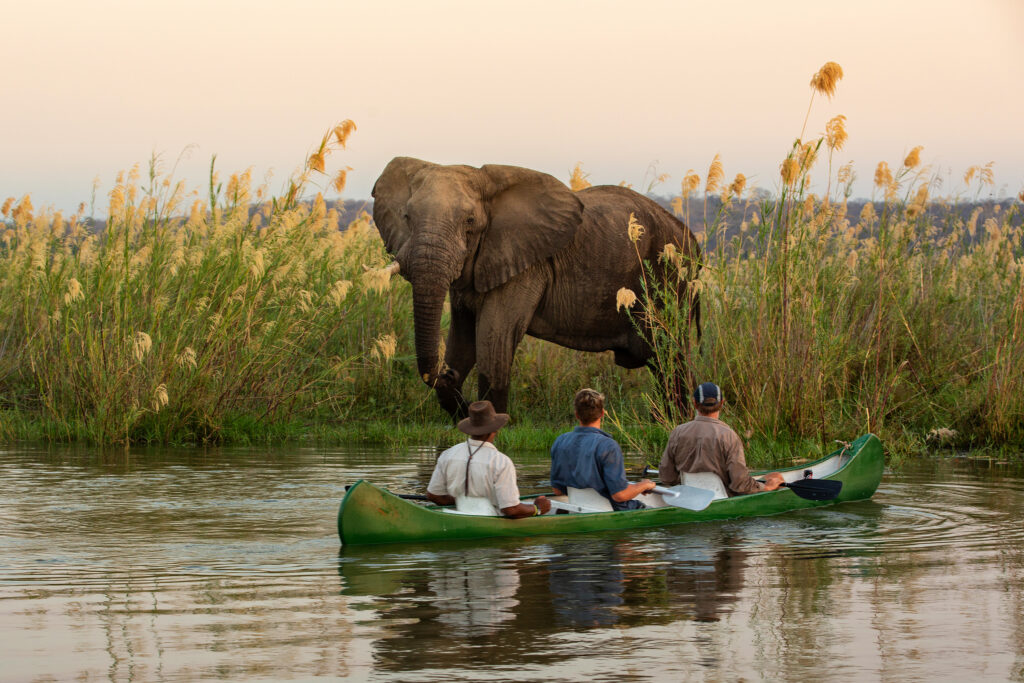
Alicia-Rae: What would you say travelers can do to support travel as a force for good and to travel more sustainably?
Dereck Joubert: I think, obviously, showing up would be great. Getting here and coming out into the field. I think that people should realize if they pick the right companies and camps and destinations, they’re already contributing enormously, as the last couple of years showed us. So a huge thanks from me already goes out to anybody who’s traveling now and picking the right destination, and I hope that Great Plains is one of those.
The second thing is getting involved because it can be enriching. Not sitting in the back of the vehicle and checking off boxes, but rather asking the right questions about cultures and communities. I want people to become involved and to become knowledgeable. Not everybody can write a sizable check, but you can most certainly lean forward and say, I need to find out a little bit more about poaching in Botswana or the livestock issues in East Africa.
The three fundamental pillars of anti-conservation are ignorance, greed, and corruption. Ignorance is huge because so many people in the world just do not know that it’s bad to buy ivory, for example, or to use rhino horn for medicinal purposes or trophies or to hunt. I think that more and more people come to our camps and learn about this and get engulfed. They leave with not only an enriched experience but their knowledge is better about it so that when they sit at a dinner party or cocktail event in New York or Helsinki, they can talk about it with some knowledge and then influence other people.
I think that ignorance is the strongest thing that we can arm ourselves against. Because once people know that, for example, if you go out and shoot a male lion, you’d probably also sign in a death warrant on his brother or cousin, the second male lion. And then when those two male lions are gone, new male lions come in, and they kill all the cubs, and probably one or two females get killed as well. So you’d probably be signing the death warrant for 20 to 30 lions every time you shoot one.
Plan your Trip
Ready to start planning your own incredible adventure? We make the process stress-free and enjoyable.
